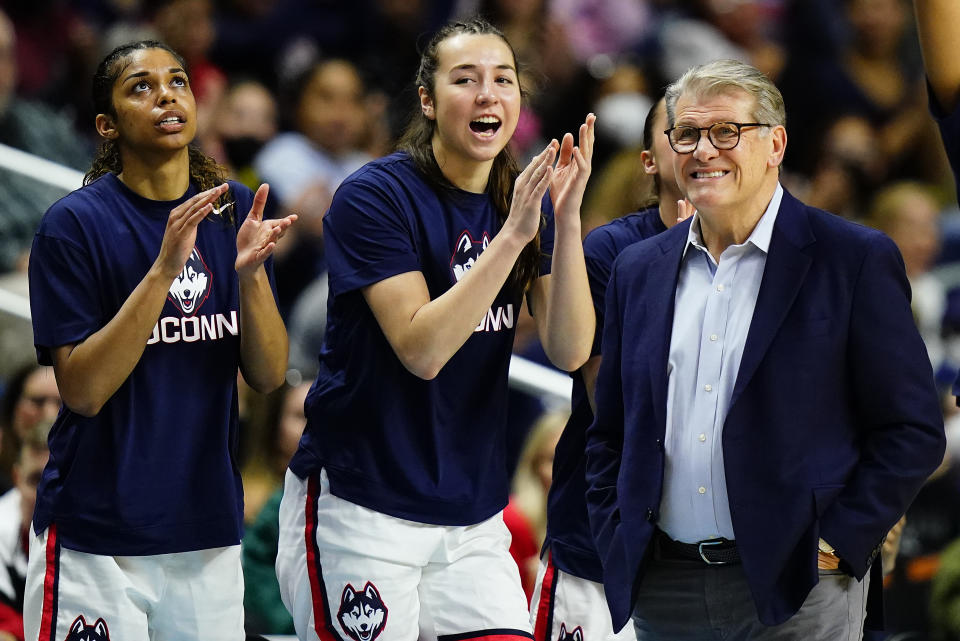It’s always the trivial aspects that blow a story open. That’s the chatter acceptable for the surface-level dinner-table talk or quick “did u c this??” share of a TikTok.
Basically, “we talk about the dumbest things,” UConn head coach Geno Auriemma told reporters on Tuesday in Minneapolis ahead of the Final Four. And as with most things Auriemma says, there’s some truth to it if you dig between the rest. Like a realtor gushing about the cute, staged kitchen while the foundation sits cracked behind a boarded-up basement door, there’s more to see beyond the surface.
Coaches of First Four teams to Final Four ones have been asked over the past two weeks if they believe the NCAA has made substantial progress toward gender equity in the men’s and women’s basketball tournaments. It has been the guiding conversation this season after putting the 2021 tournaments in separate bubbles forced the world to see the clear differences in plain view.
The overwhelming answers appear to be, well, no. At least not in the necessary big-picture ways that create significant impact. The issues coaches have homed in on for decades and most glaze over.
“You know what we didn’t take care of?” said Auriemma, who is finishing his 37th year with UConn. “Two teams played last night, Monday night, to go to the Final Four, and now we play Friday, and we fly out [Tuesday]. The guys finished Sunday, and they get Monday, Tuesday, Wednesday, Thursday, Friday and then they play Saturday.
“Why don’t you address things that actually help kids get ready to play their best basketball at the most important time of the year? But we’ve got the weight room squared away, and I’m sure we got other things squared away, but we don’t get squared away the things that are most important.”
It is the best year for Auriemma to bring this concern. UConn and N.C. State played the first double-overtime game in Elite Eight history on Monday in Bridgeport, Connecticut, that ended around 10 p.m. ET. Auriemma told NCAA digital the team didn’t get home until 2 a.m. and flew to Minnesota on Tuesday afternoon. By the time they arrived in Minneapolis, that’s two full days at the Target Center before tipping off Friday night.


It doesn’t have to be this way. The time is here to look at everything. The NCAA, on the recommendation of the Kaplan Report, conducted a “zero-based” budget to start from scratch and eliminate inequities that have grown over time.
“Zero-base” it all, from the selection committee to regional sites to the day the season ends. Everyone should be asking “why are we doing this?” to every bit. And when the answer is “because it’s always been that way,” rip it down. If you assess your financials every year, there’s no reason not to do the same for policies and structures.
A simple solution is to push games back to Sunday/Tuesday to allow more recovery time and for these student-athletes to enjoy the week without feeling squeezed into a short time frame. Now is the time to think bigger than simple. Because even that would still fall into the trite habit of placing an emphasis on the men as if they are the default and women should program around them.
There has been so much talk of a combined Final Four location — a proposition most coaches disagree — so how about combined Final Fours on TV? Do a full day of Saturday semifinals, rotating between the men and women, then back-to-back championship games on that Monday night. Every year the lead game can be switched between women and men.
That shouldn’t be a problem. All women’s sports fans hear in online “well actually” chatter is that TV time and channels don’t, well, actually matter when it comes to TV viewership numbers (which is not true). And basketball fans will love another full day of action. That is the beauty of March Madness.
To do that would take buy-in from broadcasters and that’s hard to come by as it is. The women’s championship game was pushed back into prime time on ESPN only because the MLB lockout wiped out the first two weeks of games. Otherwise, it would have served as the company’s lead-in to “Sunday Night Baseball” with a dinner-time tip. And none of these women’s programs at the peak of their sport will receive a dime for their success as the men’s programs do with “units” awarded to conferences for their team’s tournament runs.
“To really make changes, we have to have a similar unit structure,” Tara VanDerveer, the Stanford head coach since 1985, said on Tuesday. “I mean, I love the crowds. I love the signage. I don’t really notice it. It doesn’t feel like that much different.
“I think really the bottom line is it’s a television package and it’s a unit structure. When that happens, then we’ll know that it’s serious.”
It’s unfair to hinge a lack of dramatic change on an organization that plans years in advance and can’t pivot on big issues. It’s one thing to call in a weight room at the last minute, a necessary change even if Auriemma quipped his players haven’t picked a weight up in 21 years. It’s another to change the entire system in an offseason.
NCAA president Mark Emmert hedged on the issues during a news conference Wednesday, saying there are “the beginning of discussions” and they’re “considering” splitting up the sports media package. Any of that is in play only because of those trivial issues that spread on social media and third-hour morning TV shows. It forced the NCAA’s hand. Now, think wider.
It is past time for everyone to stop talking about the “dumbest” things and start talking about issues like unit structure and zero-balanced planning at the dinner table before tipoffs this weekend.
